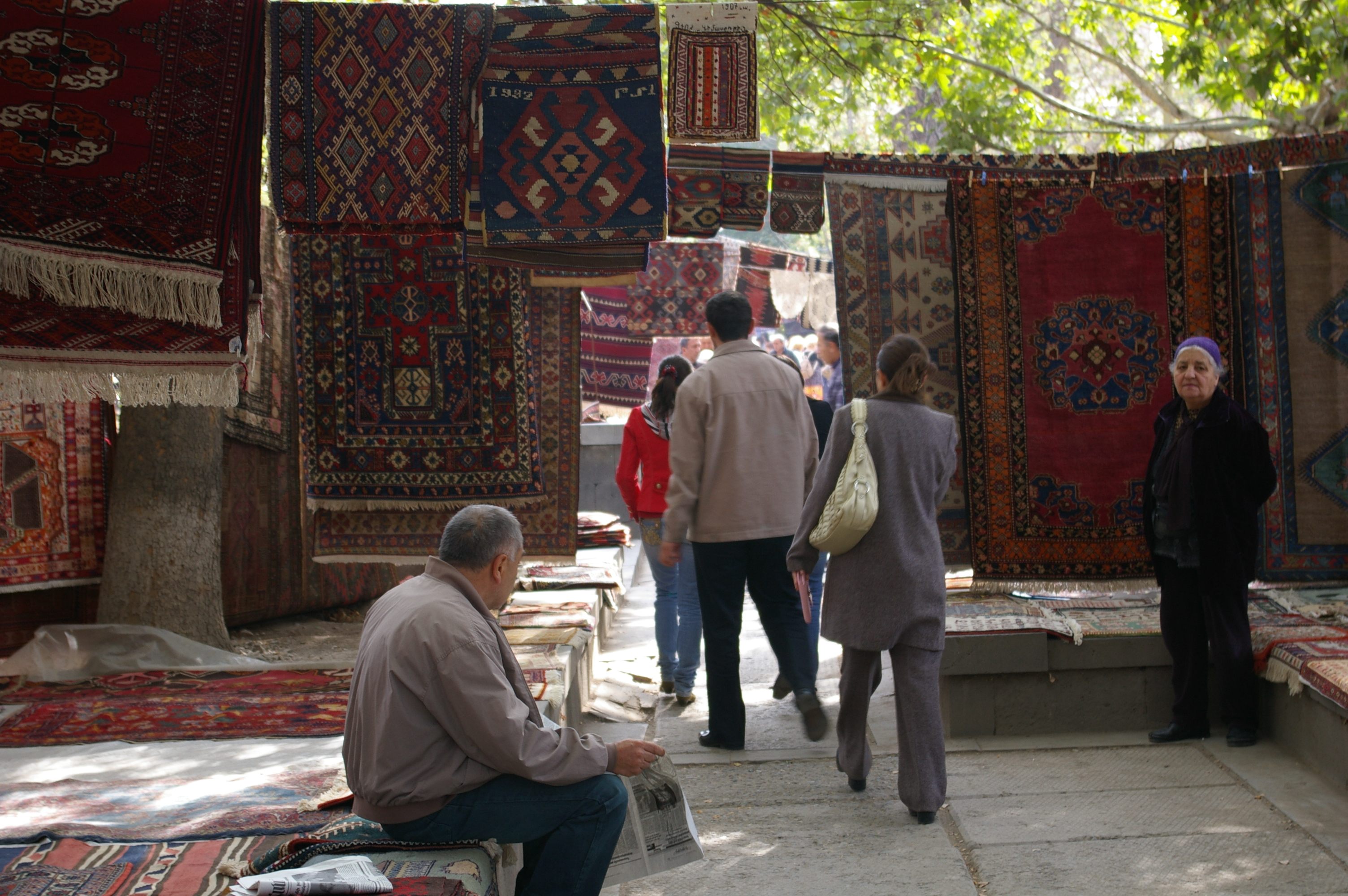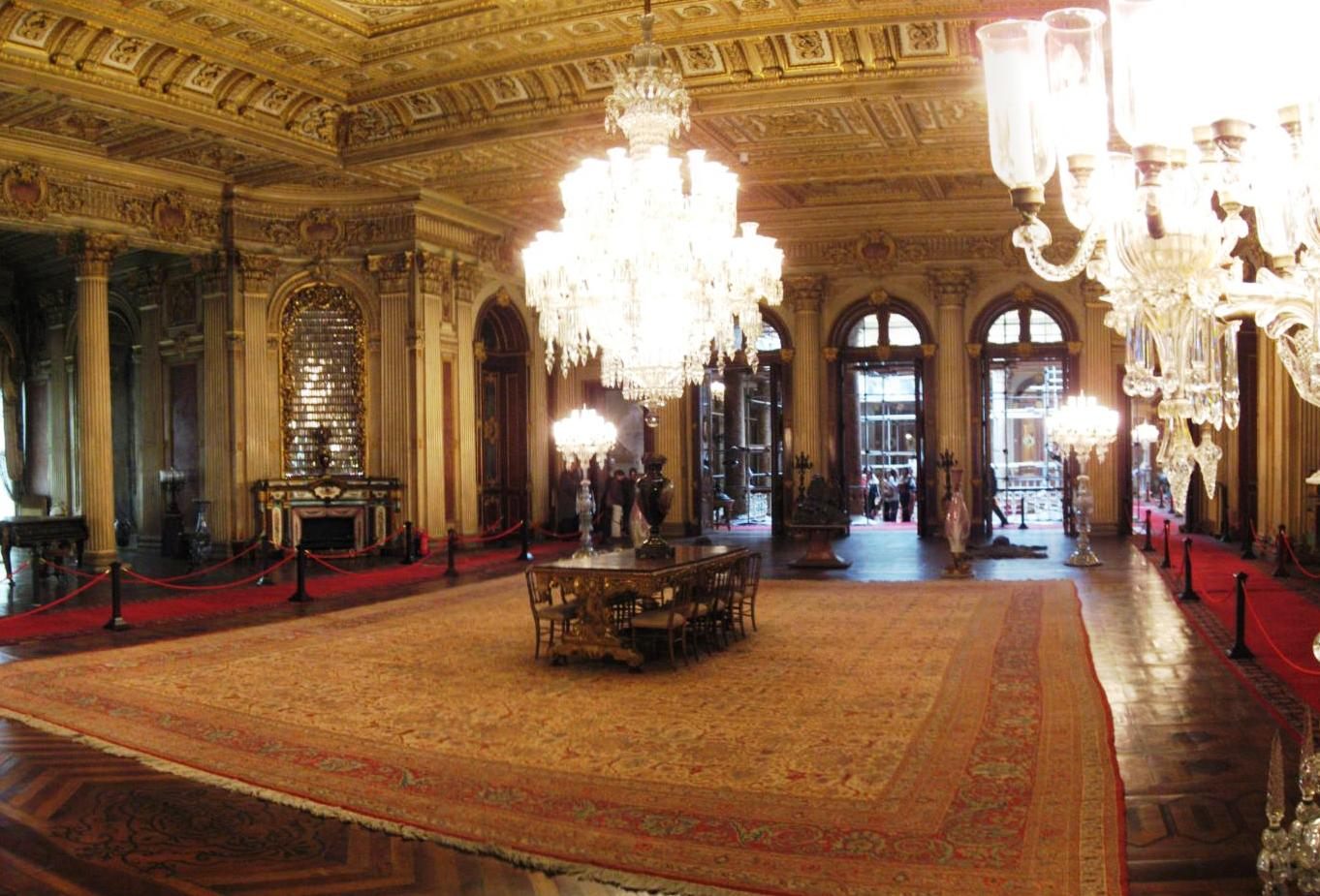China Cloned A Famous Turkish Carpet–and The Name of The Town it Came From

Chinese carpets are sneaking into foreign markets, fooling tourists and knocking down local prices. (Photo: Deb Collins/WikiCommons CC BY 2.0)
Hereke carpets have a unique, illustrious, and now confused history that began over 150 years ago in a village on the edge of Turkey’s Izmit Bay, near Istanbul. The intricate weavings are known for being some of the finest hand-knotted carpets in the world. So how is it possible that near-identical versions of the decorative rugs are tumbling out of Chinese factories, but labeled “Made in Hereke”?
Perhaps because China went ahead and named a manufacturing complex the “Hereke Industrial Zone,” thereby enabling companies to legally tag their products with the Hereke name. But what about Hereke, Turkey? Is anyone there upset?
Hereke, Turkey technically no longer exists; it lost its municipality status in 2008 due to an insufficient population. The unfortunate circumstance only aided Chinese efforts to tap into the centuries-old Hereke carpet industry. According to Turkish newspaper The Hurriyet Daily News, the Chinese have taken over 90 percent of the local Hereke market, which constitutes one quarter of Turkey’s $2 billion carpet market.
When asked how Chinese manufacturers are changing the Turkish carpet landscape, Solveigh Calderin, the owner of Hereke Carpets, responded with the tweet: “You are destroying the work places of Turkish women with your mass production fakes!”
The Turkish are proud of the quality and artistry of their carpets and their distinguished history, and none more so than their Hereke, which boast high levels of craftsmanship. A proper Hereke carpet is made with wool or silk through a painstaking process of hand-made knots, and takes many months or years to complete, depending on a carpet’s size. One square meter of carpet is comprised of about one million knots, a process which might take a skilled weaver about one year.

An original Hereke carpet in the Ambassadors Hall of Dolmabahçe Palace, built by Sultan Abdulmecid in the mid-19th century. (Photo: Gryffindor/WikiCommons CC BY-SA 3.0)
The emergence of Hereke carpets can be traced back to the Ottoman Emperor, Sultan Abdulmecid, who established the Hereke Imperial Factory in 1843 to produce carpets, fabric, upholstery and curtains for Ottoman establishments including his new Dolmabahçe Palace in Istanbul. Abdulmecid was of the opinion that the world’s greatest palaces should display the finest carpets, and into the early 20th century, the Hereke weavers threaded knot after double knot not only for the imperial aristocracy, but also for visiting dignitaries and heads of state.
In 1894, German Emperor Kaiser Wilhelm II even brought gifts to further improve Hereke carpetmaking, introducing dyes that enabled the carpets to truly become the finest ever made, according to any Hereke website you consult. The coveted carpets were presented to royal families of Japan, Russia, Germany, and England, their designs combining traditional Turkish compositions with Persian and Egyptian motifs.
These days, anyone with a carpet craving can get their hands on a Hereke, but the odds of it being genuine are increasingly rare. Chinese-made carpets fall into the hands of unsuspecting tourists passing through Istanbul aching for that perfect souvenir. You can find questions posted on Lonely Planet and Trip Advisor forums asking whether or not a new purchase is a Turkish original or a Chinese clone. One Hereke website clarifies, “The Ottoman Empire never extended to China and there has never been a Hereke Imperial Factory in China.” But did they know that there is a Hereke Industrial Zone?
“These imitations do not use the same production techniques, nor do they use the same quality materials as genuine Turkish Hereke carpets,” the webpage continues. Chinese Hereke carpets are reportedly woven by machine and with inferior materials—but here’s the question: can anyone besides experts really tell the difference?

Traditional Turkish carpets, knotted by hand. (Photo: Public Domain/WikiCommons)
If you can’t make the trip to Turkey, log onto eBay and you’ll find plenty of Hereke to choose from, as cheap as $30. One of the chief sellers, Yilong Carpet, claims to have 9,000 skilled weavers at its headquarters in Henan, China. The 30-year-old company has over 800 items listed on eBay, with carpets selling for up to $84,000, and it claims to have sold its handmade products in over 100 countries. Yilong apparently even created specially customized silk carpets for Kazakhstan’s presidential palace.
In 2015, Yilong Carpet launched a handmade “Top-Turkey” series, which apparently has no actual association with Turkey. Amy Yu, a company representative, clarified via email, “We cannot send these rugs to Turkey. It is just a name. There is no any meaning.”
Some Hereke experts provide detailed instructions on how to differentiate a real Hereke from a fake, such as counting the knots and demanding a certificate. But as for cheats, Yilong’s website also has a page for “hateful swindlers.” But who’s swindling whom here? And now that Hereke, Turkey, is no longer a thriving center of industry, how much does it really matter?
 A traditional Hereke carpet. Chinese are now accused of cloning not only the carpets, but the whole concept of Hereke. (Photo: Cllane4/WikiCommons CC BY-SA 3.0)
A traditional Hereke carpet. Chinese are now accused of cloning not only the carpets, but the whole concept of Hereke. (Photo: Cllane4/WikiCommons CC BY-SA 3.0)
Brian Berkey, Assistant Professor of Legal Studies and Business Ethics at the Wharton School of the University of Pennsylvania, says that the “Made in Hereke” carpets do seem intuitively problematic. “As a philosopher, I would want to know–what are the important values that are being violated?” he asks. “This is actually a topic of debate among philosophers–how important these sorts of historical, cultural practices are, and the moral issues raised by their being taken on outside of what’s sort of thought of as the original, cultural context.”
You could look at the issue through the lens of history and culture, or perhaps from the perspective of art and forgeries (or simply judge the economic impact). “I think this case is really interesting because probably a lot people have this very strong intuitive reaction,” says Berkey, “but it can be hard to explain that reaction, and to put into words what really seems objectionable.”
China has rarely been praised for its handling of intellectual property, and many companies and countries have found China’s business ethics at times objectionable. But if China starts renaming industrial zones, we’ll soon have no idea where half our things come from, whether we’re in Istanbul or Walmart.
Solveigh Calderin, of Hereke Carpets, later tweeted, “Very simple: The Chinese Hereke fakes are destroying the market. That’s all.”








Follow us on Twitter to get the latest on the world's hidden wonders.
Like us on Facebook to get the latest on the world's hidden wonders.
Follow us on Twitter Like us on Facebook